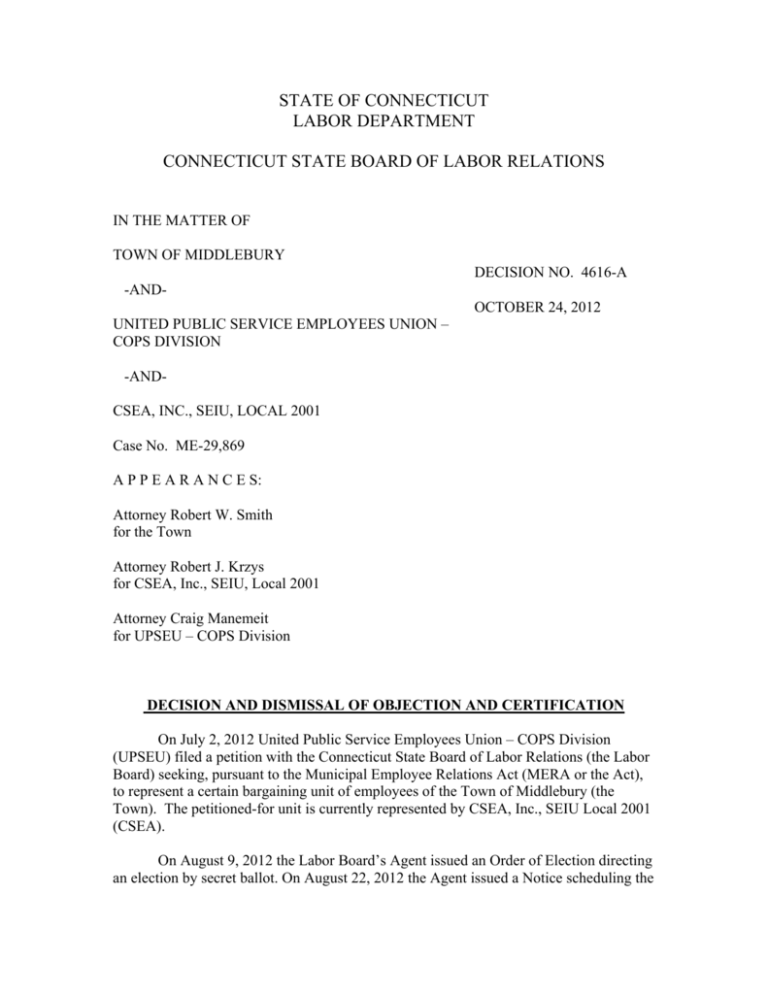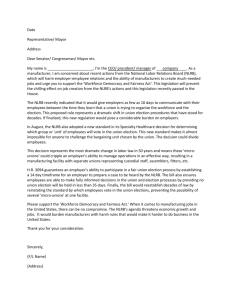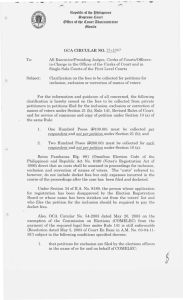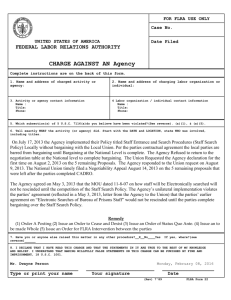4616
advertisement

STATE OF CONNECTICUT LABOR DEPARTMENT CONNECTICUT STATE BOARD OF LABOR RELATIONS IN THE MATTER OF TOWN OF MIDDLEBURY DECISION NO. 4616-A -ANDOCTOBER 24, 2012 UNITED PUBLIC SERVICE EMPLOYEES UNION – COPS DIVISION -ANDCSEA, INC., SEIU, LOCAL 2001 Case No. ME-29,869 A P P E A R A N C E S: Attorney Robert W. Smith for the Town Attorney Robert J. Krzys for CSEA, Inc., SEIU, Local 2001 Attorney Craig Manemeit for UPSEU – COPS Division DECISION AND DISMISSAL OF OBJECTION AND CERTIFICATION On July 2, 2012 United Public Service Employees Union – COPS Division (UPSEU) filed a petition with the Connecticut State Board of Labor Relations (the Labor Board) seeking, pursuant to the Municipal Employee Relations Act (MERA or the Act), to represent a certain bargaining unit of employees of the Town of Middlebury (the Town). The petitioned-for unit is currently represented by CSEA, Inc., SEIU Local 2001 (CSEA). On August 9, 2012 the Labor Board’s Agent issued an Order of Election directing an election by secret ballot. On August 22, 2012 the Agent issued a Notice scheduling the election for September 5, 2012 and CSEA filed an Objection To Agent’s Direction of Election contending that the contract bar set forth in Section 7-471(1) 1 of the Act applied and also that the election should be blocked given the pendency of a certain prohibited practice complaint 2 before the Labor Board. On August 29, 2012 UPSEU filed a memorandum in opposition to CSEA’s objections. On August 30, 2012 the Labor Board issued Town of Middlebury, Decision No. 4616, dismissing CSEA’s blocking charge objection and on September 5, 2012 an election was conducted with the following results: Number of Ballots Cast…………………………………….10 Number of Ballots Counted………………………………...10 Number of Votes IN FAVOR of representation by UPSEU……………………………………………...10 CSEA………………………………………………...0 Number of Blank Ballots…………………………………….0 Number of Void Ballots……………………………………...0 Number of Challenged Ballots……………………………….0 CSEA now seeks a hearing and ruling with respect to its contract bar objection. DISCUSSION The contract bar rule arises by statute and prohibits a representation election during the term of a collective bargaining agreement except for “good cause.” Recognizing that a series of collective bargaining agreements could indefinitely deny employees an opportunity to express their wishes concerning bargaining unit representation, we have always provided for a “window period” at a fixed point in time prior to expiration of the collective bargaining agreement during which we will consider a petition timely. State of Connecticut, Department of Correction, Decision No. 4571 (2011); Woodstock Board of Education, Decision No. 1992 (1981). The window period in MERA is established by Section 7-471-8(b) 3 of our regulations. 1 C.G.S. §7-471(1) states in relevant part: “. . . No election shall be directed by the board during the term of a written collective bargaining agreement, except for good cause. . .” 2 On April 18, 2012 CSEA filed a complaint (Case No. MPP-29,746) which alleged that the Town engaged in illegal unilateral action and discrimination based on union activity. An objection to an election on the basis of pending unfair labor practice matters is commonly termed a “blocking charge” by our federal counterpart. See Bishop v. NLRB, 502 F.2d 1024 (5th Cir. 1974). 3 Regs., Conn. State Agencies §7-471-8(b) provides, in relevant part: “A petition will be considered timely if it is filed between 180 and 150 days prior to the expiration of the collective bargaining agreement. . .” 2 In recognition that collective bargaining agreements of extended duration could also effectively deny employees an opportunity to choose a representative we adopted the “three year rule” of our federal counterpart 4 noting that it “provides for a reasonable period of time in which an incumbent union and an employer can enjoy a collective bargaining relationship without the pressures of an emotionally taxing and disruptive organizing campaign . . .[yet it] . . . prevents a contract from indefinitely denying to employees the freedom to change or choose a bargaining representative.” City of Bridgeport, supra, at p. 5 (1995). In this case it is undisputed that UPSEU’s petition was filed during the fourth year of a collective bargaining agreement with effective dates of July 1, 2009 through June 30, 2012. While CSEA admits that UPSEU’s petition was filed after the expiration of the third year of the contract, CSEA contends the petition is untimely because it was not filed in the window period provided for by Section 7-471-8(b) of the regulations. In short, CSEA contends that the petition is timely under the three year rule only if it is filed in January preceding the expiration of the third year of the contract or in January preceding each annual anniversary of such expiration. While we agree that a petition is timely if filed between 180 and 150 days prior to the expiration of the third year of the contract, both our case law and that of the NLRB support a conclusion that a petition is also timely when filed any time after such expiration. The NLRB rule originated in Pacific Coast Ass'n of Pulp & Paper Manufacturers, 121 NLRB 990 (1958) which set a two (2) year duration on the contract bar. “To be timely . . . a petition must be filed from 150 to 60 days before the end of the first 2 years of the contract term or after the expiration of this 2-year period.” Id, 121 NLRB at 993 (emphasis added). In General Cable Corp., 139 NLRB 1123 (1962) the NLRB subsequently set a three (3) year limit on the contract bar but retained all other aspects of the rule: “Today . . . we enlarge the 2-year period to 3, making no other changes. . .” Id. at 1125. In short, the NLRB treats a petition as timely if it is filed either during the window 5 preceding the three (3) year anniversary or after such anniversary. The Labor Board’s cases also contemplate timely filing after expiration of the third contract year. City of Bridgeport, Decision No. 3486 (1997) rejected a claim that the petitions at issue were untimely filed outside the regulation window period because “both petitions occurred in the fourth year of a four- year contract. Although the labor contract may have been in effect, it was not operating as a bar to the filing of a petition during its fourth year.” Id. at p. 7. (emphasis added). In Town of Madison, Decision No. 4103 (1995) the contract ran from July 1, 2000 to June 30, 2004 and upon expiration interest arbitration was imposed. The Board found that “[t]he first window period 4 “Under this rule a contract in excess of a three year term cannot bar a representation petition filed after the first three years of the contract. General Cable Corp. 139 NLRB 1123 (1962).” City of Bridgeport, Decision No. 3338, p. 4 (1995). See also NLRB v. Burns International Security Services, Inc., 406 U.S. 272, 290 n. 12 (1972). 5 The NLRB contract bar window is known as the “open period” and is 90 to 60 days before contract expiration. 3 occurred from January 1, 2003 through January 31, 2003. . . The second of these window periods occurred from July 1, 2003 to the date binding interest arbitration was imposed . . .” Id. at p.4. (emphasis added). Lastly, in Town of Hamden, Decision No. 4182 (2006) the contract ran from July 1, 1999 to June 30, 2003 and an interest arbitrator was appointed in April of 2005 when the parties were unable to negotiate a successor agreement. The Board found that “the first window period . . . occurred in January, 2002. . . The window opened again on July 1, 2002 and remained open until the neutral arbitrator was appointed in April, 2005.” Id. at p. 4. (emphasis added). The petition at issue was timely because it was filed after the third year of the collective bargaining agreement between CSEA and the Town had expired. As such, we deny the request for a hearing, dismiss the remaining objection and certify the results of the election. ORDER By virtue of and pursuant to the power vested in the Connecticut State Board of Labor Relations by the Municipal Employee Relations Act, it is hereby CERTIFIED, that United Public Service Employees Union COPS Division has been designated as the representative for the purposes of collective bargaining by the majority of all employees of the Middlebury Police Department with the authority to exercise police powers, who are regular full time employees of the Police Department, excluding the Chief of Police and that said United Public Service Employees Union COPS Division is the exclusive representative of all said employees for the purposes of collective bargaining with respect to wages, hours and other conditions of employment. CONNECTICUT STATE BOARD OF LABOR RELATIONS Patricia V. Low Patricia V. Low Chairman Wendella Ault Battey Wendella Ault Battey Board Member Barbara J. Collins Barbara J. Collins Board Member 4 CERTIFICATION I hereby certify that a copy of the foregoing was mailed postage prepaid this 24th day of October, 2012 to the following: Attorney Robert W. Smith Robert W. Smith Law Offices, LLC 20 Woodside Avenue, P.O. Box 1263 Middlebury, CT 06762 RRR Attorney Robert J. Krzys P.O. Box 207 New Hartford, CT 06057 RRR Attorney Craig Manemeit United Public Service Employees Union P.O. Box 2 Clinton, CT 06413 RRR ________________________________ Harry B. Elliott, Jr., General Counsel CONNECTICUT STATE BOARD OF LABOR RELATIONS 5
![Labor Management Relations [Opens in New Window]](http://s3.studylib.net/store/data/006750373_1-d299a6861c58d67d0e98709a44e4f857-300x300.png)





